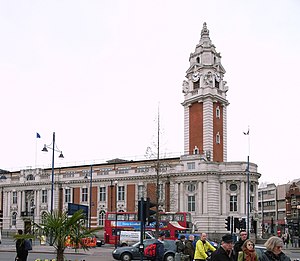Difference between revisions of "Brixton"
m (→LGBT history) |
m (→LGBT history) |
||
| Line 9: | Line 9: | ||
In the early 1970s a number of [[GLF]] supporters lived in squats in Brixton, and formed the [[South London Gay Community Centre]] at 78 Railton Road.<ref>http://www.urban75.org/blog/the-brixton-fairies-and-the-south-london-gay-community-centre-brixton-1974-6/</ref> | In the early 1970s a number of [[GLF]] supporters lived in squats in Brixton, and formed the [[South London Gay Community Centre]] at 78 Railton Road.<ref>http://www.urban75.org/blog/the-brixton-fairies-and-the-south-london-gay-community-centre-brixton-1974-6/</ref> | ||
| − | In 1985 [[Linda Bellos]] was elected as a Labour councillor to Lambeth London Borough Council and was leader of the council between 1986 and 1988. She was the second black woman to become leader of a British local authority, after Merle Amory in the northwest London borough of Brent. Bellos resigned as leader on 21 April 1988 after disputes within the Labour Party over the setting of the Council budget. She was a prominent figure in left-wing politics in London in the 1980s and was labelled by The Sun as a member of the 'Loony Left'. Bellos attempted to become a parliamentary candidate, without success, most notably for Vauxhall. | + | In 1985 [[Linda Bellos]], a lesbian feminist, was elected as a Labour councillor to Lambeth London Borough Council and was leader of the council between 1986 and 1988. She was the second black woman to become leader of a British local authority, after Merle Amory in the northwest London borough of Brent. Bellos resigned as leader on 21 April 1988 after disputes within the Labour Party over the setting of the Council budget. She was a prominent figure in left-wing politics in London in the 1980s and was labelled by The Sun as a member of the 'Loony Left'. Bellos attempted to become a parliamentary candidate, without success, most notably for Vauxhall. |
<ref>http://en.wikipedia.org/wiki/Linda_Bellos</ref> | <ref>http://en.wikipedia.org/wiki/Linda_Bellos</ref> | ||
Revision as of 13:55, 16 February 2015
Brixton is a district in the London Borough of Lambeth, south London, with a shopping centre and well-known street market. It is a very ethnically diverse area, with a large Afro-Caribbean population. Notable buildings include Lambeth Town Hall, and Brixton Prison.The Brixton riots in 1981 prompted the Scarman Report which recommended major changes in policing procedures.
LGBT history
The singer Skin was born in Brixton in 1967.
In the early 1970s a number of GLF supporters lived in squats in Brixton, and formed the South London Gay Community Centre at 78 Railton Road.[1]
In 1985 Linda Bellos, a lesbian feminist, was elected as a Labour councillor to Lambeth London Borough Council and was leader of the council between 1986 and 1988. She was the second black woman to become leader of a British local authority, after Merle Amory in the northwest London borough of Brent. Bellos resigned as leader on 21 April 1988 after disputes within the Labour Party over the setting of the Council budget. She was a prominent figure in left-wing politics in London in the 1980s and was labelled by The Sun as a member of the 'Loony Left'. Bellos attempted to become a parliamentary candidate, without success, most notably for Vauxhall. [2]
From 1981-2010, The Fridge nightclub, founded by Andrew Czezowski, in Town Hall Parade was one of London’s most popular gay clubs. The Fridge was at the heart of the early 80s New Romantic movement, and booked such acts as Eurythmics and the Pet Shop Boys before they were well known and drew famous faces such as Boy George,[1] Frankie Goes to Hollywood, Magenta Devine, and Marc Almond and Grace Jones who also performed there. From 1992-2001, Love Muscle was a popular gay night on Saturdays and drew thousands of followers from all over London.
Gay Pride (see London Pride) held it’s festival in Brockwell Park in 1993 and 1994 – Lambeth town hall flew a freedom flag.
In 1997-1999 Brockwell Park played host to Summer Rites festival, organised by Kim Lucas and Wayne Shires who decided that London needed its own festival, at a time when London Pride was being seen as an event for the whole country, and other towns were having their own Pride events.
In 1999, David Copeland planted a nail bomb in Electric Avenue, directed against the local black community, injuring about 50 people, as part of his hate campaign which also included bombs in Brick Lane (directed against the Asian Community) and the Admiral Duncan, Soho, directed against the gay community.
In 2001, Brian Paddick, then police commander for Lambeth, pioneered a more relaxed attitude to the policing of cannabis possession in Brixton.
Lambeth Goldies met in Brixton.
There is a blue plaque to the sexologist Havelock Ellis at Dover Mansions on Canterbury Crescent.
